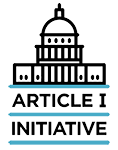Federalist Society Review, Volume 23
For the Federalist Society Review, Paul James Larkin reviewed The Administrative State Before the Supreme Court: Perspectives on the Nondelegation Doctrine (Peter J. Wallison & John Yoo eds., Am. Enter. Inst. 2022):
Administrative law lies at the intersection of civics, political science, and constitutional law, with each field contributing to the structure of and justification for the administrative state that governs much of contemporary life. Fortunately, administrative law attracts some of the brightest and most prolific scholars in the academy and legal profession. Through books, articles, and blog posts, they regularly debate the competing positions on how the regulatory state should be structured and how a particular architecture advances the public interest while remaining faithful (or not) to the tenets of the three fields noted above. There is an enormous body of literature in this field, and, given the subject’s importance, there is no reason to believe that this scholarly output will slow down in the foreseeable future.
A recently published book—The Administrative State Before the Supreme Court: Perspectives on the Nondelegation Doctrine—is a timely and valuable contribution to that literature. It addresses a subject of intense scrutiny in today’s administrative law scholarship: the Nondelegation Doctrine. Nondelegation literature focuses on the issue of what limits, if any, there are on Congress’s ability to delegate to agencies the power to adopt rules that bind the public. The editors, Peter Wallison and John Yoo, persuaded more than a dozen scholars and practitioners to examine the Nondelegation Doctrine and draft predictions about its future. The authors do not disappoint. The collection of essays brings to mind a remark made by President John F. Kennedy at a White House dinner for Nobel laureates. With his typical eloquence, President Kennedy said that “this is the most extraordinary collection of talent . . . that has ever been gathered together at the White House, with the possible exception of when Thomas Jefferson dined alone.” The same could be said about Nondelegation Perspectives. The goal of this book review is to do justice to the essayists and their work in this valuable book.
The vitality of the Nondelegation Doctrine is an important public policy issue. Statutes and rules reflect a tradeoff between often-conflicting values, such as “human health versus economic growth.” Different people balance those interests differently, and the theory of our system is that the electorate chooses representatives to express its different views. But the citizenry elects none of the executive agency officials whom Congress vests with the authority to manage the national government’s business, which perennially raises questions about the administrative state’s legitimate role in governance. Moreover, “[a]dministrative agencies are issuing about 3,000 regulations with the force of law each year, roughly 28 times the number of public laws enacted annually by the Congress.” The legitimacy of delegated administrative governance, therefore, is no small potatoes matter. The Supreme Court has allowed Congress to use broadly and imprecisely written laws to substitute appointed for elected officials as policymakers. A vibrant Nondelegation Doctrine would return to the public a sizeable portion of its ability to choose its lawmakers.
Part I of this review will summarize the Nondelegation Doctrine for the benefit of readers who are unfamiliar with it. (Administrative law professors, scholars, practitioners, and buffs can skip ahead to Part II). Part II will summarize the essays in Nondelegation Perspectives and discuss how they hope not only to advance the ball down the field, but also to persuade the most important potential participants—the Justices of the Supreme Court of the United States—to play the game. Part III will offer an observation from a fan of the game.

 Paul Larkin
Paul Larkin 